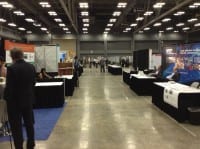
Jonathan Robinson, currently Director of resources and Legal Services at the Environment Agency, England and Wales, has been appointed a Visiting Professor to the Faculty.
Jonathan was a senior lawyer at the Department of Environment Food and Rural Affairs, before taking up the position of Chief Legal Adviser to the Ministry of Social Development, New Zealand. He was subsequently appointed Chief Legal Adviser to the Department of Communities and Local Government before taking up his present position with the Environment Agency in 2009.
On learning of the appointment, Jonathan said, “I’m have always greatly enjoyed my discussions with the high calibre students and academic staff and researchers at UCL, and am delighted and hugely honoured to be made a Visiting Professor. I look forward to working more closely with UCL over the coming years”
Richard Macrory, co-director for the Centre for Law and the Environment, commented, “We are all absolutely delighted at the prospect of closer collaboration with Jonathan – he is someone with enormous experience of environmental law and the machinery of government, and his appojntment comes at a period in the development of thinking about environmental regulation and environmental regulators.”
Jonathan’s CV
Filed under Activities
Comments Off on Jonathan Robinson Appointed Visiting Professor

 Close
Close



 Working in partnership with the
Working in partnership with the  The study was officially launched on 7 June 2014 at the 2nd World Summit of Legislators, hosted by the Mexican Congress of the Union in Mexico City. More than 500 presidents, speakers and senior legislators from around the world attended the Summit. One of the study’s lead authors
The study was officially launched on 7 June 2014 at the 2nd World Summit of Legislators, hosted by the Mexican Congress of the Union in Mexico City. More than 500 presidents, speakers and senior legislators from around the world attended the Summit. One of the study’s lead authors 
 On the 6th of March 2014, King’s College, in collaboration with UCL, organised a conference on Carbon Capture and Storage (CCS) (see our
On the 6th of March 2014, King’s College, in collaboration with UCL, organised a conference on Carbon Capture and Storage (CCS) (see our  On the 6th of March 2014, King’s College, in collaboration with UCL, organised a
On the 6th of March 2014, King’s College, in collaboration with UCL, organised a 


